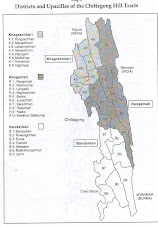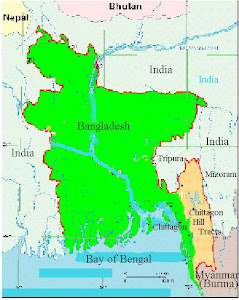
Recently, our reporter visited Kapru Para in Bandarban to investigate the impact of outside interaction on the life of Murung nationality, the third largest ethnic group in Chittagong Hill Tracts. We intend to release the findings in a series of photographic expositions. Please find attached the first of the six-picture series.
Photo1 of 6:
Kapru Para, a Murung village nestled on picturesque Chimbuk hill 45 km south-east of Bandarban town in South CHT. The Bangladesh army has reportedly planned to acquire 2,400 acres of land inhabited by Murung nationality. Kapru Para is one of many villages that will face total destruction if the plan is implemented.
In 2006, the BD Army built so-called "Neelgiri", a posh tourist resort, on 16 acres of traditional Jum land of the Murung people. It was inaugurated by the incumbent army chief General Moeen U Ahmed. The Chief Adviser Fakruddin Ahmed will stay here during his tour of Rangamati and Bandarban on 27 March. Another dignitary who graced this tourist resort is Foreign Affairs Adviser, Mr. Iftekar Ahmed, who visited Bandarban in the end of last year.
One of the lesser known facts about the attitude of the Jumma people towards the liberation war of Bangladesh is that during the war's initial period the slain President General Ziaur Rahman took shelter in a Murung village. It was because of sincere cooperation of the "savage" Murung people that the General could conduct successful military operations against the marauding Pakistani Army.
But what did the Murungs get in return? After 36 years of independence, they still remain one of the most backward communities in Chittagong Hill Tracts. Governments have come and gone, but they remain where they had been. During the last decades, they only saw their jum lands being taken away by outsiders.
During his visit, the Chief Adviser is scheduled to speak to the residents of Kapru Para. Will he assure them that his government will not take any decision that might cause their displacement and that they will be able to live as dignified citizens?
Photo1 of 6:
Kapru Para, a Murung village nestled on picturesque Chimbuk hill 45 km south-east of Bandarban town in South CHT. The Bangladesh army has reportedly planned to acquire 2,400 acres of land inhabited by Murung nationality. Kapru Para is one of many villages that will face total destruction if the plan is implemented.
In 2006, the BD Army built so-called "Neelgiri", a posh tourist resort, on 16 acres of traditional Jum land of the Murung people. It was inaugurated by the incumbent army chief General Moeen U Ahmed. The Chief Adviser Fakruddin Ahmed will stay here during his tour of Rangamati and Bandarban on 27 March. Another dignitary who graced this tourist resort is Foreign Affairs Adviser, Mr. Iftekar Ahmed, who visited Bandarban in the end of last year.
One of the lesser known facts about the attitude of the Jumma people towards the liberation war of Bangladesh is that during the war's initial period the slain President General Ziaur Rahman took shelter in a Murung village. It was because of sincere cooperation of the "savage" Murung people that the General could conduct successful military operations against the marauding Pakistani Army.
But what did the Murungs get in return? After 36 years of independence, they still remain one of the most backward communities in Chittagong Hill Tracts. Governments have come and gone, but they remain where they had been. During the last decades, they only saw their jum lands being taken away by outsiders.
During his visit, the Chief Adviser is scheduled to speak to the residents of Kapru Para. Will he assure them that his government will not take any decision that might cause their displacement and that they will be able to live as dignified citizens?





